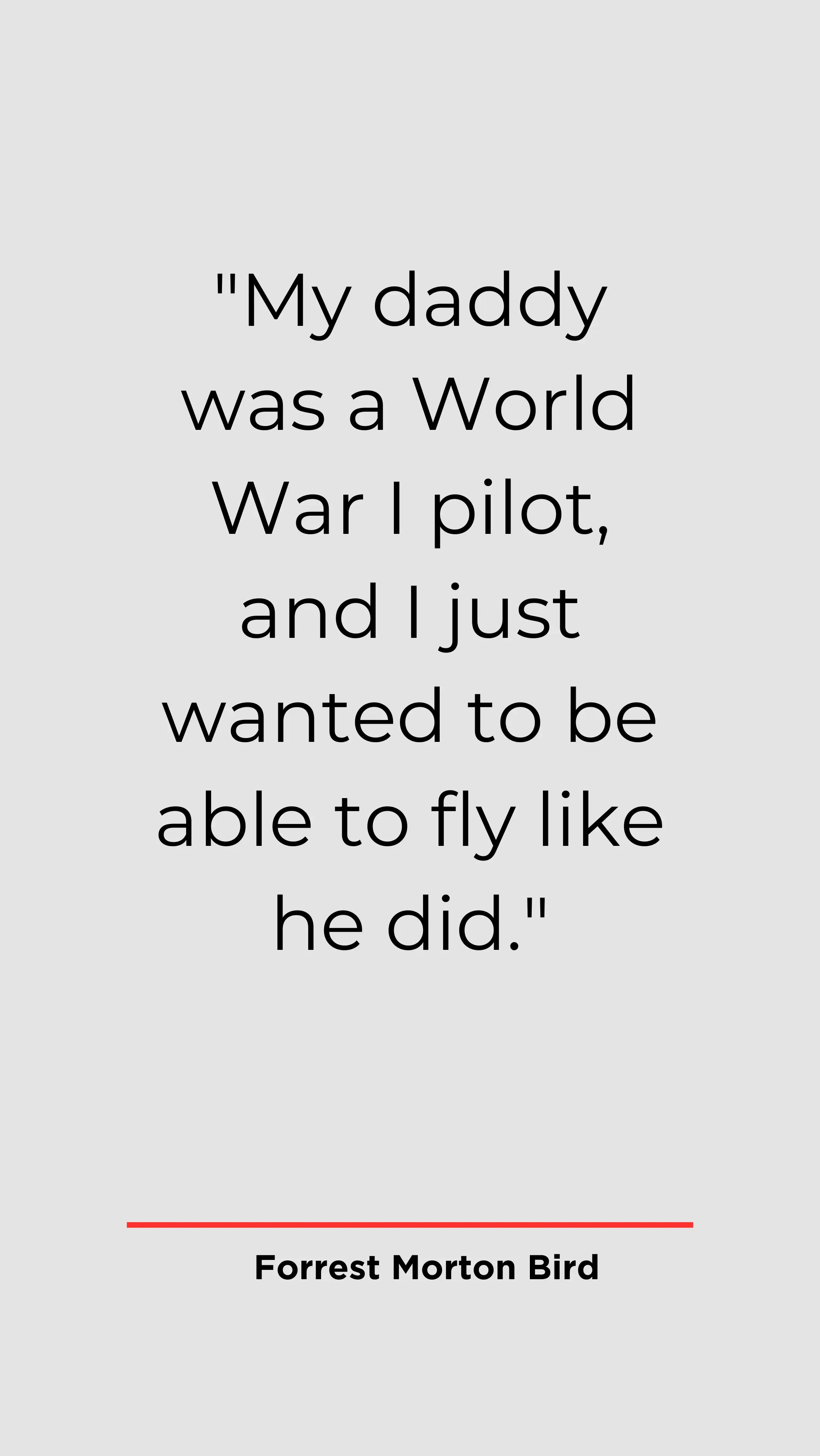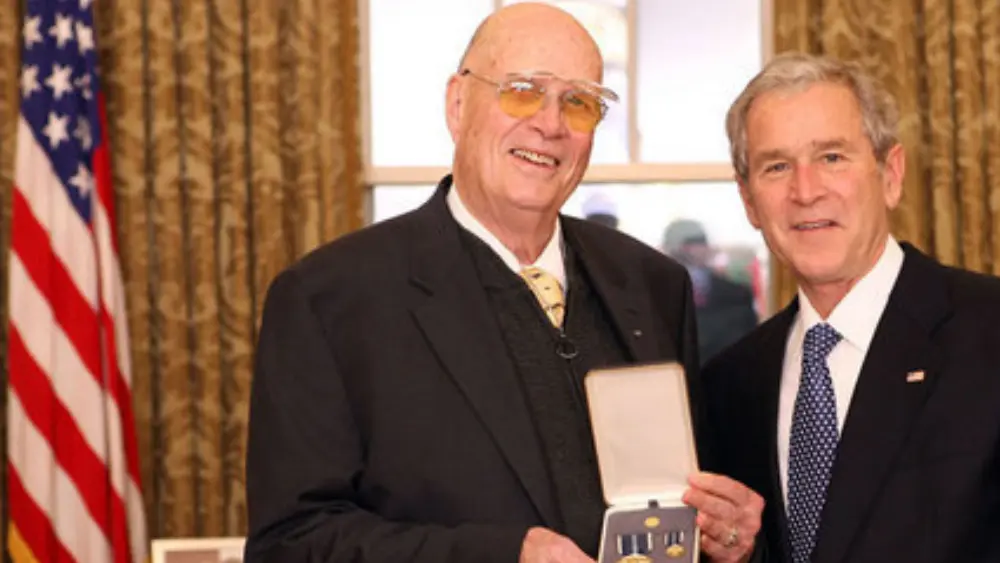Forrest Morton Bird, born on June 9, 1921, in Stoughton, Massachusetts, was a pioneering American aviator, inventor, and medical innovator whose groundbreaking work revolutionized both the field of aviation and healthcare. He is best known for his invention of the Bird Universal Medical Respirator, which became a vital tool in treating patients with respiratory conditions.
Early Passion for Aviation
Forrest Bird’s journey into the world of aviation began with an early and unwavering passion for flight. Even as a young boy, he exhibited an innate curiosity and fascination with the skies above. At the tender age of 12, Bird embarked on a remarkable endeavor by constructing his very first glider, a project that foreshadowed his future in aviation. This youthful endeavor marked the genesis of a lifelong dedication to the field.
Bird’s commitment to aviation remained steadfast as he pursued a formal education in aeronautical engineering. His path led him to the prestigious Massachusetts Institute of Technology (MIT), where he delved into the intricacies of aircraft design and engineering. This academic pursuit sharpened his technical skills and equipped him with the knowledge and foundation needed to launch a distinguished career—one that would leave a lasting impact on both aviation and medical technology.
Forrest Morton Bird: World War II Service and Its Influence
Forrest Morton Bird’s commitment to aviation extended into his service during World War II, where he played a crucial role as a flight surgeon in the U.S. Army Air Forces. In this capacity, he was entrusted with the care and well-being of pilots and aircrews, gaining firsthand insights into the unique medical challenges faced by those in the field of aviation. It was during his wartime service that Bird’s passion for flight and his deepening understanding of the medical needs of aviators converged.
The experiences and observations he made while caring for those in the air forces exposed him to the critical necessity for advanced medical equipment, especially in the demanding and high-stress environment of aviation. These formative experiences during World War II planted the seeds for Bird’s future endeavors in medical technology, inspiring him to develop innovative devices that would revolutionize the field of respiratory care and healthcare at large. His wartime service not only solidified his dedication to improving the lives of others but also set the stage for his groundbreaking contributions that would impact healthcare and save countless lives in the years to come.
The Bird Universal Medical Respirator
Following his service in World War II, Forrest Morton Bird turned his engineering talents toward the field of medical innovation. In 1958, he achieved a major breakthrough with the introduction of the Bird Universal Medical Respirator, also known as the Bird Mark 7 respirator. This portable mechanical ventilator represented a remarkable leap forward in respiratory care technology. It played a pivotal role in providing life-saving support to patients grappling with respiratory issues, ranging from those suffering from chronic conditions to individuals in critical care situations.
The Bird Universal Medical Respirator quickly gained recognition and widespread adoption in hospitals and healthcare facilities. Its portability and effectiveness revolutionized the treatment of respiratory ailments, offering a level of care and support that was previously unavailable. Bird’s invention not only improved the quality of life for countless patients but also paved the way for future developments in medical technology and the field of respiratory therapy. His pioneering work in this domain is a testament to his commitment to advancing healthcare and his remarkable ability to translate his passion for aviation into innovative solutions that had a profound and lasting impact on the medical world.
Forrest Morton Bird: Medical Advancements and Innovations
Forrest Morton Bird’s journey of innovation in medical technology did not stop with the Bird Universal Medical Respirator. Throughout his remarkable career, he continued to pioneer advancements that transformed healthcare. One of his notable contributions was the development of the Baby Bird ventilator, specifically designed for neonatal care. This groundbreaking device played a critical role in improving the survival rates of premature infants. Bird’s dedication to saving lives extended to the most vulnerable patients, and the Baby Bird ventilator remains a testament to his unwavering commitment to enhancing healthcare outcomes.
Bird defined his legacy in the medical field through his relentless pursuit of innovation. He pursued every advancement with a deep-seated desire to alleviate suffering and improve the quality of life for individuals in need. His ability to adapt and apply his engineering expertise to medical challenges yielded transformative solutions that continue to benefit patients and healthcare providers alike. Forrest Morton Bird’s legacy is not only one of technological ingenuity but also a profound commitment to advancing the frontiers of medicine and ensuring that his innovations directly impacted the well-being of countless individuals, particularly those most in need of specialized care.
In addition to his iconic respirators, Bird also contributed to the development of advanced pulmonary function testing equipment and trained thousands of respiratory therapists in the use of life-saving technologies. His holistic approach to innovation encompassed both creating the tools and empowering the people who would use them, further amplifying his impact on global healthcare.
Awards and Recognition
Forrest Bird’s remarkable achievements in the fields of aviation and healthcare garnered him a host of prestigious awards and recognitions. These honors cemented his status as an influential figure in both realms. One of the most notable accolades he received was the National Medal of Technology and Innovation. This prestigious honor was presented to him by President Ronald Reagan in 1985. This award underscored the profound impact of Bird’s inventions and innovations on medical technology and the broader field of healthcare.
The National Medal of Technology and Innovation recognized Bird’s pioneering spirit and his dedication to improving the lives of individuals through technological advancements. It served as a testament to his exceptional contributions to society, as well as his relentless pursuit of innovation and excellence. Bird also received numerous honorary doctorates and professional society awards, further acknowledging his status as a leading figure in both the scientific and medical communities.

Forrest Morton Bird: Enduring Legacy
Forrest Morton Bird’s legacy is one of enduring significance, deeply rooted in the evolution of healthcare and medical technology. His inventions, particularly in the realm of respiratory devices, have reshaped the way clinicians approach critical care. The ventilators he pioneered, including the Bird Universal Medical Respirator and the Baby Bird ventilator, have saved thousands of lives and are integral components of modern respiratory care.
Bird united the seemingly disparate fields of aviation engineering and medicine, creating solutions that were both technically sophisticated and human-centered. He demonstrated how expertise from one discipline could inform and transform another. His work exemplifies the true potential of interdisciplinary collaboration. It highlights the extraordinary outcomes that can result when innovation is driven by a mission to improve lives.
Beyond the machines he built, Bird actively shaped his legacy by mentoring countless medical professionals, saving patients, and establishing new standards of care. His inventions continue to serve as foundational technologies in hospitals across the world, and his influence remains embedded in every breath supported by a modern ventilator.
His passion for sharing knowledge and fostering the next generation of inventors led him to establish the Bird Aviation Museum and Invention Center in Idaho. There, he showcased not only his own achievements but also celebrated the broader spirit of invention. He was hoping to inspire future innovators to push boundaries just as he had.
Conclusion
Forrest Morton Bird’s life and work serve as powerful reminders of how one individual’s vision and perseverance can redefine entire industries and transform countless lives. His story is a testament to ingenuity, service, and the enduring drive to use science and technology for the greater good. His impact will continue to be felt across generations, reminding the world that meaningful change often begins with a bold idea and the courage to pursue it.
From a seasoned inventor transforming healthcare, Bird’s journey reminds us that true innovation often begins with a simple question. And that question is, ‘How can we make this better?’ Through his life’s work, Bird answered that question again and again. He left behind a world undeniably improved by his vision and determination.











